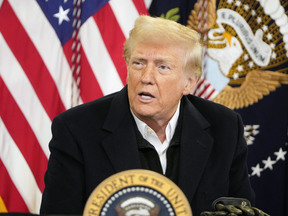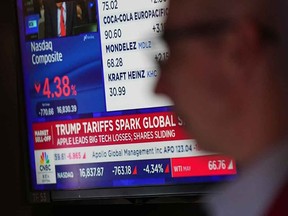Canada should reconsider to avoid retaliation, experts say
Article content
Some of Canada’s biggest corporations could find themselves in the crosshairs if U.S. President Donald Trump’s administration decides to employ an obscure clause in the American tax code in retaliation for the digital services tax.
Article content
Article content
The clause, Section 891 of the U.S. Internal Revenue Code, would allow Trump to double corporate taxes on Canadian companies operating in the United States. Trump signed an order on Monday asking the Treasury secretary to “investigate whether any foreign country subjects U.S. citizens or corporations to discriminatory or extraterritorial taxes.”
Advertisement 2
Article content
Section 891 states that when a president finds such discrimination, the tax rates should “be doubled in the case of each citizen and corporation of such foreign country.” Trump’s memo calls for his officials to deliver a report to him on these “discriminatory” and “extraterritorial taxes” by April 1.
Canada’s controversial digital services tax (DST), which came into effect last year, imposes a three per cent tax on digital service providers with revenue exceeding $20 million. Eighteen other countries have similar tax laws, but Canada’s DST was met with dissent from both American and Canadian politicians and trade experts.
Matthew Kronby, partner, competition, trade and foreign investment, and Patrick Marley, partner, tax at Osler, Hoskin & Harcourt LLP, said in an email to Financial Post that there is “more than a theoretical chance” Trump could use Section 891 in response to Canada’s DST.
Kronby and Marley wrote that the Biden administration clearly considered the DST discriminatory against American companies, noting that last August, the U.S. had requested dispute settlement consultations with Canada under the Canada-United States-Mexico Agreement (CUSMA) on that basis.
Article content
Advertisement 3
Article content
“There’s no reason to think that the Trump administration takes a different view nor — as the Jan. 20 America First trade policy memo reflects and the actions of the first Trump administration demonstrated — that it would refrain from acting unilaterally rather than using the dispute settlement mechanism available in the CUSMA,” they said.
It’s not just the DST that could be a potential target, they added. The U.S. has also expressed concerns over Canada’s proposal to adopt the undertaxed profits rule (UTPR), which requires a taxpayer to pay top-up tax that is not otherwise collected under other rules.
Trump’s memo on the Organisation for Economic Co-operation and Development (OECD) on Monday included investigating whether any foreign countries “are likely to put tax rules in place, that are extraterritorial or disproportionately affect American companies.”
The UTPR was proposed as part of Canada’s adoption of the OECD’s Pillar Two framework, which is aimed at ensuring large multinational corporations pay a minimum level of tax in all jurisdictions in which they operate.
Advertisement 4
Article content
“I’m not surprised that Trump would be upping the ante,” said trade expert Mark Warner of Maaw Law, adding that he originally expected retaliation from the Biden administration.
Warner said it’s important to take Trump’s bluster with a grain of salt, especially since Section 891 has never been used — but not to ignore the potential of some very real consequences.
“He could very easily get what he wants by using Section 301,” Warner said, pointing to the section of the U.S. trade act that allows for such retaliatory measures as sanctions and tariffs against countries that impose unfair trade barriers or violate trade agreements with the U.S. “It would be the more normal course to take in response to something like countries imposing a DST.”
Warner believes Trump is using Section 891 to show Canada that the U.S. can go beyond 25 per cent tariffs to hurt Canadian businesses.
“The threat of Section 891 is a way of bringing the parties to the table to either negotiate a better agreement or to not overreact if he does use Section 301 and everybody will breathe a collective sigh of relief that he just imposed tariffs.”
Advertisement 5
Article content
Warner thinks this is not an imminent problem and that Trump could also face legal or constitutional challenges about the propriety of using Section 891 in such a context.
Tariq Nasir, a partner with Ernst & Young’s indirect tax group, said his clients aren’t as concerned with the possibility of double taxes right now because the threat of 25 per cent tariffs being imposed in February feels much more immediate and detrimental to their businesses.
Still, the potential impact to Canadian businesses that are based in the U.S. would certainly be adverse.
Warner pointed to banks being more vulnerable, since it would be harder for these institutions to distance themselves from their Canadian parents, compared to, say, a tech company.
Jessica Brandon-Jepp, senior director of fiscal and financial services policy at the Canadian Chamber of Commerce, said the chamber had long warned that the DST was “a severe trade irritant that could lead to retaliatory measures” in a statement to Financial Post.
According to Connect2Canada, Canadian investment in the U.S. accounts for about 12 per cent of all foreign investment, with more than 5,500 Canadian-owned businesses operating there, supporting nearly 900,000 jobs.
Advertisement 6
Article content
“Canadian consumers and businesses will continue to pay a heavy price for the federal government’s inaction,” Brandon-Jepp said, adding that Ottawa needs to “remove these irritants now and focus on providing certainty and clarity to businesses at home.”
Kronby and Marley felt Canada should reconsider its approach to the DST, particularly the retroactivity of the tax back to 2022.
“It would be more constructive to negotiate an acceptable outcome with the U.S. in a manner that better aligns with international norms,” they wrote.
The Osler partners also said Canada should pause the implementation of the global minimum tax (and the UTPR in particular) until the U.S. adopts the rules as well. They felt this tax would reduce the competitiveness of Canadian based multinational enterprises, especially compared to those based in the U.S..
Warner, too, cautioned that Canada needs to be careful in how it responds.
Recommended from Editorial
He believes the first step is to get rid of the DST to avoid the threat of doubled taxes on Canadian businesses and individuals situated in the U.S., and to avoid the retaliation route.
“The further this tit-for-tat retaliation game plays (out) with Canada … (it’s) ultimately a game that Canada will lose,” Warner said.
• Email: slouis@postmedia.com
Bookmark our website and support our journalism: Don’t miss the business news you need to know — add financialpost.com to your bookmarks and sign up for our newsletters here.
Article content
Canadian business could pay price for digital services tax
2025-01-24 21:19:21




